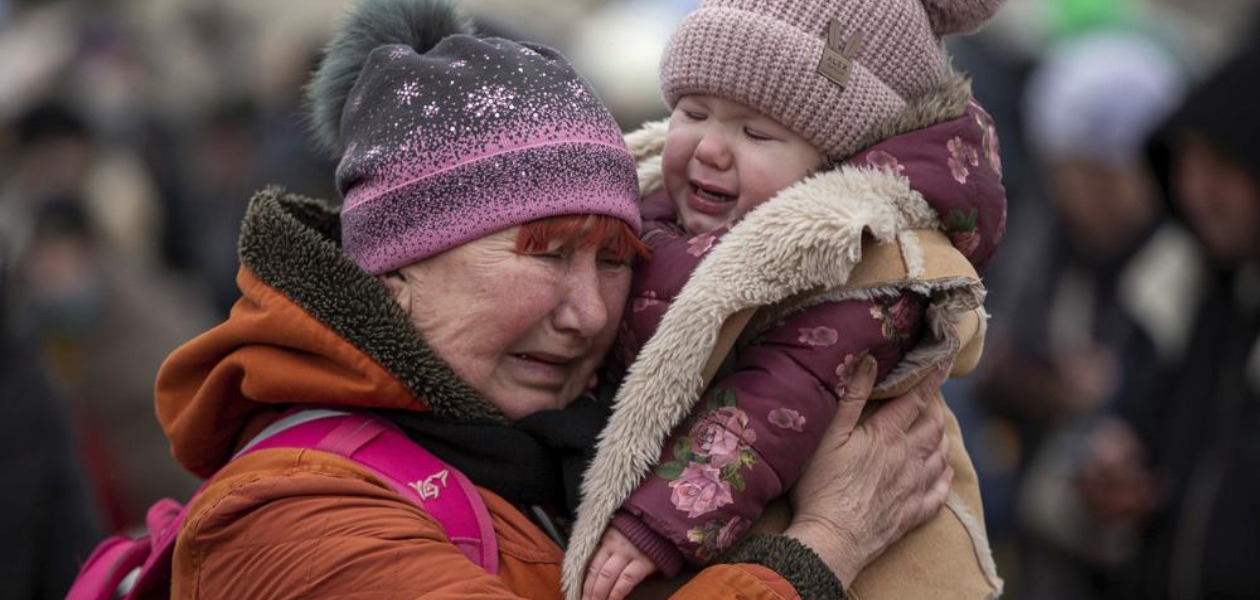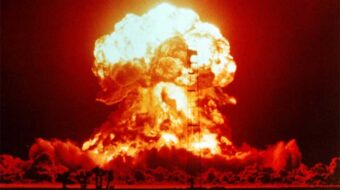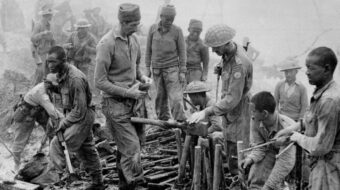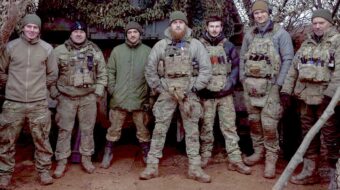
Russian President Vladimir Putin this past weekend turned down numerous requests from foreign leaders that he agree at least to ceasefire in his war against Ukraine as the number of Ukrainians fleeing across the border into Poland, Romania, Slovakia, and Russia ballooned to 1.5 million of the nation’s population of 44 million. The refugee crisis is the worst in Europe since World War II when many millions were uprooted in the wake of the war and Holocaust instigated by the Nazis.
On the battlefield, the illegal and deadly invasion of Ukraine by Russia continued on many fronts, with Ukrainians in both the regular army and in other groups resisting the advance of Russian troops. While the casualty figures are impossible to verify, U.S. officials say some 2,000 Ukrainians and a similar number of Russians have died. Russia says it has lost 500 soldiers, while Ukraine claims Russia has lost 60,000. Many U.S. television networks have begun saying now when broadcasting videos of the conflict, whether they come from Russia or Ukraine, that they have not verified their content.
While discussion of the politics involved is necessary, alone it cannot convey the effects on real people of this epic humanitarian disaster. People young and old are freezing and starving at the same time they are dealing with being uprooted from their homes.

A New York Times photojournalist said she witnessed families making their way across a river where the bridge had been blown up by Ukrainians trying to slow the Russian advance toward Kiev. The journalist said she watched the family as they were all killed by a Russian soldier on the other side.
Russian-speaking Ukrainians judged to be supporters of the Russians have been shot and killed by other armed Ukrainians, a Brooklyn, N.Y., Ukrainian couple with relatives in Kiev and Kharkov told People’s World Sunday.
Putin may be making a point to prove his determination when he orders the shelling of villages, but for the people who live there, the price of him making a point is losing their home.
At the Polish border, weeping fathers kiss their wives and children goodbye as they return to Ukraine to fight the Russians. In the east of Ukraine, including the Donbass, villages from which the Ukrainian Army withdraws are burned down.
The Russians blame the Ukrainians, and the Ukrainians blame the Russians. A key question now is whether the heavy sanctions leveled against Russia can bring these disasters to an end.
If the heavy sanctions the U.S. has levied on Russia were intended to end the war, there is no sign that they are working—at least not now. If the aim is instead to destroy the Russian economy and set back that country’s working class along with it, the sanctions are well on the way to achieving their goal.
Thus far, the U.S. has led many other nations in freezing Russian assets abroad and, even more radically, has frozen the assets worldwide of the Russian Central Bank. The U.S. has ended the freedom of Russians to travel outside their country by banning flights of Russian airlines and travel by ground transport out of Russia. The U.S. has also imposed severe personal sanctions on Putin and the corrupt “oligarchs” closest to him. Wealthy capitalist kingpins not in Putin’s circle have not yet been sanctioned.
The sanctions have crashed the ruble and shuddered the stock market as Russians form long lines trying to take out cash from ATMs. All the credit card companies controlled by U.S. banks—MasterCard, Visa, and American Express—have frozen the accounts of everyone living in Russia and also made it impossible to use those accounts anywhere outside of Russia. That move alone has put billions of dollars into the hands of CEOs of U.S. banks who apparently wanted to get on board with the arms manufacturers and fossil fuel companies who have already made their own killing off this war.
Not to be left behind, Germany has sharply increased its military spending and is literally re-arming to “counter Putin’s menace,” as the New York Times put it. Finland has been strong-armed into sending weapons, even though its Prime Minister has pledged it will not join NATO.
The Times lectured Germany in its editorial Sunday by warning Germans that, due to their dependence on Russian energy, they “have to start preparing for a future independent of Russia.” So the Times, rather than fostering trade and cooperation for peace in Europe, is siding with the energy monopolies in the U.S. that are determined to replace Russian gas with their more expensive fracked gas.
The newspaper even went so far as to say that Germany should halt its elimination of the use of nuclear power and keep its remaining nuclear plants operating.
Switzerland, the money laundering capital of the world, says it will freeze all Russian assets stashed in its country. The move is described as a “surprising blow for democracy by historically neutral Switzerland,” which supposedly remained neutral even in World War II. (Swiss “neutrality” during that war involved wining and dining the German Nazi elite and top capitalists from the U.S. and Britain, sometimes simultaneously in different rooms of the same hotels in Zurich.)
The New York Times admitted that the U.S.-led sanction campaign has not gotten Putin to back down in Ukraine but said they were necessary anyway to show that his invasion has consequences. Needless to say, the Times did not mention that ending the war might not be the top priority for some of the powerful companies that want to rake in profits from the humanitarian disaster unfolding in Europe.
Most wars, no matter how horrific, end with some form of diplomacy. If the purpose of the sanctions is to end the war, some type of offer needs to be made by the West. “Agree to a ceasefire, take out your troops and then we can do X, Y, or Z” is an approach that should be tried. Instead, there is a deadly cycle of more and more sanctions in response to more and more escalation by Putin. He responded to one set of sanctions by making threats about the possible use of nuclear weapons, for example, and the U.S. followed that with more sanctions, which Putin, in turn, followed with stepped-up bombings, and on and on.
Ukrainians continue to die, Russians suffer from both the sanctions and the lies told to them by Putin, and workers in the West are told that soon it will be their turn to “sacrifice” for the war effort. The Times describes the war in Ukraine as a conflict that is part of a worldwide fight to save democracy. Its editorial ended by warning that a “new order” will unfold around the world when the war is over.
“Whatever new order might emerge from this terrible war and the likely occupation of Ukraine,” the Times said, “it is the duty of all (national) leaders to prepare their countries for it, even if the pain it will cause is still unknown.”

President Joe Biden’s “duty” is to “stop telling Americans,” the Times said, “that they will not have to sacrifice.” Throwing out the progressive agenda of the Biden administration is apparently not something that worries the “Newspaper of Record.” After all, the war in Ukraine provides the perfect excuse.
Worse than not having the effect of changing minds in Russia, there are signs that the sanctions could be having the opposite effect. Nina Khrushcheva, the great-granddaughter of former Soviet Premier Nikita Khrushchev, is a Professor of International Affairs at New York’s New School. Speaking on MSNBC Sunday, she said prior to the invasion Putin had a 60% approval rating but that now, after the imposition of sanctions, his approval rating has gone up to 71%.
The sanctions have apparently enabled his ruling clique, she says, to blame all the country’s economic problems on the West, including problems that result from the exploitation of workers by capitalists in Russia. Khrushcheva is no apologist for Putin; she has devoted many years to attacking him as she has also attacked policies carried out by the Soviet Union before it was dismantled.
The sanctions levied thus far have the potential of plunging Russia into a deep recession or depression. The country may be headed for massive unemployment, mortgage foreclosures, and other things that hit the working class harder than any other sector. War is always at the expense of workers in a world dominated by capitalists.












Comments